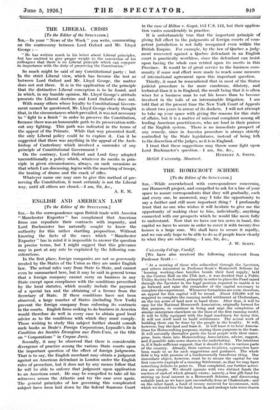THE LIBERAL CRISIS
[To the Editor of the SPECTATOR.] Sea,—In your " News of the Week " you write, commenting on the controversy between Lord Oxford and Mr. Lloyd George :—
" He has written much in his letter about Liberal principles, but has omitted to give proper weight to the conviction of his ;colleagues thit there is no Liberal principle which can compare an importance with the duty of preserving the Constitution."
So much might be said of any Constitutional party ; but In the strict Liberal view, which has become the test as rbetween Lord Oxford and Mr. Lloyd George, the matter does not rest there. It is in the application of the principle that the distinctive Liberal conception is to be found, and 'in which, in my humble opinion, Mr. Lloyd George's attitude presents the Liberal doctrine and Lord Oxford's does not.
With many others whose loyalty to Constitutional Govern- ment cannot be questioned, Mr. Lloyd George clearly thought ithat, in the circumstances which prevailed, it was not necessary to " fight to a finish " in order to preserve the Constitution, !because there was an honourable path to its preservation with- out any fighting. This path was indicated in the terms of the appeal of the Primate. While that way presented itself, the only Liberal policy could be to explore it. Can it be suggested that there was anything in the appeal of the Arch- bishop of Canterbury which involved a surrender of any principle of Constitutional Government ?
On the contrary, Lord Oxford and Lord Grey adopted unconditionally a policy which, whatever its merits in prin- ciple in given circumstances, always, on such occasions as that which I am discussing, begins with the marching of troops, the beating of drums and the crack of rifles.
Whatever name one may care to give this method of pre- serving tfie Constitution, it most certainly is not the Liberal way, until all others are closed.—I am, Sir, &c.,
A. E. M.










































 Previous page
Previous page